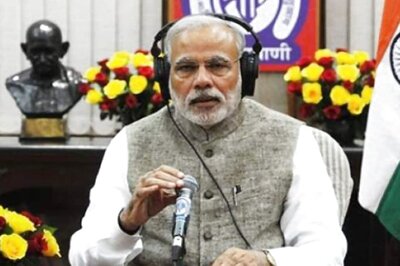
views
A country left with absolutely nothing and with absolutely everything puts mind at quite different perspectives. Almost completely looted by colonisers, India’s economy was at its worst in 1947. But there are always some things which cannot be stolen – culture, history, traditions, practices, ethics, diversity and many more intangible properties, which colonisers could never lay a hand on. It was a realisation of something much holier than any of us could ever think – it was dharma.
India has always been a powerhouse of rich cultures and traditions dating back to thousands of years. These cultures and traditions ultimately gave birth to Hinduism. It is imperative to note that Hinduism is not a single religion but a marvel of various cultures, traditions and philosophies. The same is evident from the various books which contribute to the tenets of Hinduism, like Vedas, Bhagwat Gita, Ramayana, Mahabharata, etc. There are various practices that have been passed down in the aforesaid scriptures that have contributed to better living for humans as a whole.
As time passed, the knowledge, wisdom, beliefs, traditions and ethics have been duly passed down through generations in many forms and they have represented India before other nations not as a mono-religious country but as a secular one with the freedom to choose and follow any traditions and beliefs laced with morals. Such ancient cultures and traditions have time and again helped an infinite number of people fight against all sorts of evils, both tangible and intangible, mental and physical, and have aided them to rise from the ashes. These cultures and traditions have been continually reinforced by Hindus and even people from other religions in their everyday life. India currently is prey to one such evil – COVID-19 or coronavirus -- which originated from Wuhan in China last November.
One of the worst pandemics in history, COVID-19 has penetrated almost every country leading to numerous deaths. It causes respiratory problems, tiredness and fever. Although the spread of this disease is not known to be airborne, it can spread to another person through small droplets from when the nose or mouth of a person with COVID-19 coughs or exhales. These droplets may land on a surface which the other person may come in contact with and then consequently touch his eyes, nose or mouth, which could trigger the spread.
Basic precautionary advisories by all governments include wearing a mask, avoiding shaking hands or touching a person, keeping hands away from your face, washing hands with soap for around 20 seconds, etc. In the midst of all this commotion, the world starts noticing something spectacular in those advisories – most of them have already been a part of Indian cultures and traditions from thousands of years.
The nature of avoiding shaking hands has led people to the simplest and most famous Indian tradition of a 'namaste'. One can say 'namaste' is the Indian way of greeting each other. It involves the joining of two palms together before the chest while slightly bowing to the person in front. 'Namaste' comes from the Sanskrit words 'Namah' and 'te' -- when both are combined, it gives 'Namaste', meaning “I bow to you” or “my greetings to you”.
'Namaste' is being used as a greeting when a person meets his/her family, friends, elders, young ones and even a stranger. It is known to negate any negative energy flowing around the person to whom it is addressed. It is an embodiment of spreading love and friendship. In the present context, it holds an immense significance due to its early roots in Hinduism. Though the Western culture has influenced the culture of handshakes in India, a steep rise in coronavirus cases has caused people to resort to greeting through 'namaste' rather than touching each other’s hands. As it is now known that coronavirus can spread through touching, 'namaste' has done a magnificent effort in reviving the traditions of bowing and joining palms while greeting.
During this crisis, several leaders have already adopted the practice of 'namaste', substituting the traditional practice of handshakes. French President Emmanuel Macron last month greeted and welcomed King Felipe of Spain with a 'namaste'. Similarly, Prince Charles also greeted everyone with 'namaste', while Israel Prime Minister Benjamin Netanyahu applauded the tradition of 'namaste' to fight coronavirus and urged everyone in his country to follow it. Even German Chancellor Angela Merkel and US President Donald Trump have participated in the culture of greeting others with a 'namaste' rather than handshakes.
Another one of such advisories against coronavirus is to wash hands for at least 20 seconds with water or with alcohol, which kills the germs effectively. Now as already stated above, Hinduism embodies certain ways to sustain health and hygiene. Hindu fundamentals inculcate washing hands and keeping them clean on a regular basis. The same has already been recognised by the World Health Organization (WHO) where it has stated that washing hands on a regular basis is being followed by Hindus and is part of the Hindu fundamentals, in order to prevent the spread of diseases and is in conformity with the principles of non-violence ('ahimsa') and care for others’ well-being ('daya'). Therefore, in light of the current pandemic, it is necessary to wash hands every hour or two, before and after meals, after touching any surface or a person at a public place, etc.
As Hinduism has given extraordinary things to the world, one of them happens to be yoga. Yoga is referred to be the heart of all Hindu cultures and traditions and is being followed by almost all nations. The true meaning of yoga is “to unite the mind with the spirit”. Its origins are from the Sankrit word “Yuj”, meaning “to cause unison of mind, body and soul”. Even traces of yoga have been found in the excavations of Indus Valley Civilisation.
Practically, yoga involves various “asans” or exercises carried out with controlled breathing and control on emotions. The principles of yoga propagate a healthy body in which harmonisation of mind and body takes place which contributes to our overall well-being. Yoga is also referred to as a rejuvenation and reformation process which involves meditation. With a healthy mind, body and soul, it aims at releasing all stress and tensions accumulated throughout a person’s life which immediately boosts our immunity and our ability and power to fight off diseases and ailments of every kind. At present, COVID-19 is largely affecting people with low immunity levels which is making the disease easier to conquer their bodies and therefore, it is necessary to boost our immunity levels through yoga.
When it comes to a sustained healing of a human body, the most ancient treatments and cures are always found not in modern medicines but ayurveda, also known as the “mother of all healing”. Ayurveda has been a part of Indian culture for more than 5,000 years. It has even been referred in Ramayan when Hanuman brought the Sanjeevani Booti for Laxman. In Sanskrit, ayurveda means “The Science of Life”.
As there is no known cure or vaccine against COVID-19, ayurveda has drawn the attention of all Indians as also advocated by Prime Minister Narendra Modi where he has suggested that Indians follow various guidelines of ayurveda as mentioned by the Ministry of AYUSH in order to boost immunity.
Some of these include drinking warm water all day; using turmeric, cumin, coriander and garlic in food; eating Chyavanprash everyday in the morning (sugar-free for diabetics); drinking herbal tea twice a day with basil, cinnamon, black pepper, dry ginger, raisin; taking half tablespoon of turmeric with a glass of hot milk.
Hinduism does not have a clearly defined god or a dominating philosophy or a holy book or a prophet or a church or a religious hierarchy. The secular and the sacred are not separated. Hinduism is referred to more as a way of life than as a religion. The aforementioned habits and traditions applicable to our daily routine are more significant than ever amid the pandemic and it is time for us to retrace our steps to our roots, which calls for a strict following of such traditions. As the PM has already extended the lockdown, it is time to restrict ourselves from our regular life and focus upon and infuse ourselves with these Indian traditions.
(The author has practised law in the Supreme Court and various High Courts since 2006. He has a diverse litigation experience in corporate laws, criminal laws and arbitration. Views are personal.)




















Comments
0 comment